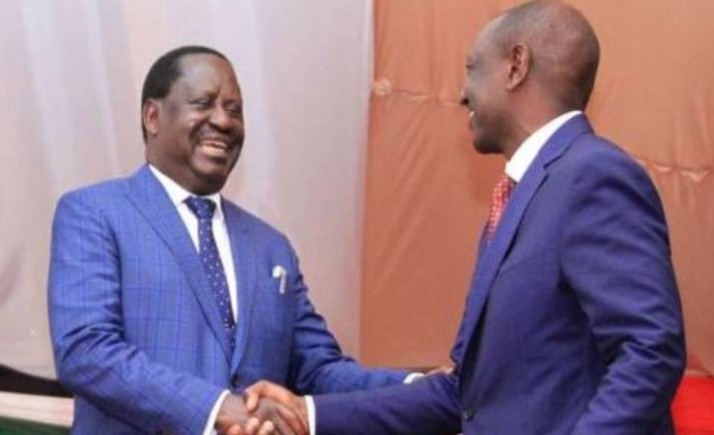President William Ruto and Orange Drmocratic Movement (ODM) Party leader Raila Odinga on Friday, March 7, signed a framework agreement at an event in KICC, Nairobi.
The two leaders have agreed on the full implementation of the National Dialogue Committee (NADCO)Report.
“Priority issues in the NADCO report like the cost of living, youth unemployment, establishing a framework for the implementation of the two-thirds gender rule have been the topic of discussion for far too long and now must be actualized,” the agreement reads in part.
The Nadco was formed after President William Ruto and Opposition Leader Raila Odinga agreed to have talks after bloody protests between March and July 2023.
Key among the recommendations was having a new electoral commission in place, measures to lower the high cost of living, creation of the office of the Leader of the Opposition and the office of the Prime Minister among others.
The committee report recommended that the Constitution be amended to establish the office of the Leader of the Opposition, an office that will go to the person who is the leader of the largest party, or a coalition of political parties which garnered the second highest number of votes at the last presidential election.
The committee recommended that the Constitution create the office of the Prime Minister who shall be nominated with the approval of the National Assembly and appointed by the President to assist the President and the Deputy President in the coordination, supervision, and implementation of government policies.
The Nadco report also made several recommendations after meeting various stakeholders and experts which included the amendment of the First Schedule to the Independent Electoral and Boundaries Commission Act, 2011 to establish a Selection Panel for IEBC Commissioners.
The report recommends that within one year of its adoption, the National Cohesion and Integration Commission (NCIC), National Gender and Equality Commission (NGEC) and Kenya National Commission on Human Rights (KNCHR) be merged, and their mandates be undertaken by the Kenya National Human Rights and Equality Commission as established under Article 59 of the Constitution.
The committee recommends that Parliament should fast-track the enactment of legislation to harmonise bicameral relations between the Houses with the Constitution being amended to provide that the term of the Senate shall expire on the seventh year from the date of the last election.
The report seeks to have the Constitution amended to promote multi-party and fidelity to political parties by entrenching procedures for resignation and deregistration of members of political parties.
This seeks to ensure party discipline and provide that a political party may enter into a pre or post-coalition agreement with another political party or political parties.
“The Constitution be amended to include, in the basic requirements of political parties, that every political party shall promote discipline within the party, conduct its affairs in a manner that promotes democracy and peaceful politics, and adheres to the values and principles of the Constitution in the nomination of persons to appointive or elective positions including Articles 27, 54, 55, 56, 57 and 100 of the Constitution,” says the report.
However, the report did not delve into how political disagreements in Kenya often lead to street protests characterised by the unlawful use of force by police, death and destruction of property that ends up bringing our political elite to the negotiation table, thus halting the protests and police action and bringing back peace.
The plight of the victims and their quest for justice, restitution, and compensation is left by the wayside, yet their blood led to the political compromises that brought back peace.
The developments in 2017, including the presidential election that was annulled, the repeat elections which the opposition boycotted later in the year and the 2018 opposition protests that are reminiscent of those of 2023, similarly led to the famous handshake that proposed the ill-fated sweeping changes to the Constitution through the Building Bridges Initiative.
If fully implemented, the Former Prime Minister is set to secure an official office as the Opposition leader or better, a Prime Minister's post in the power sharing agreement, more appointments of his loyals in government and an oversight role in some parastatals, akin to the Uhuru's Handshake or Kibaki's era agreement.







